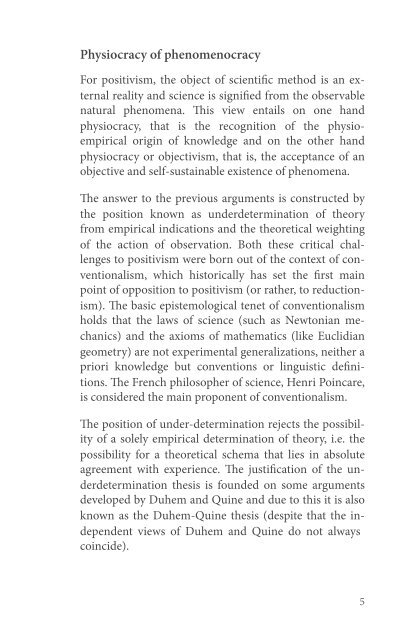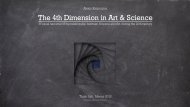PHILOSOPHY OF SCIENCE -ALEXIS KARPOUZOS
The contemporary philosophy of science & the problem of the scientific consciousness.
The contemporary philosophy of science & the problem of the scientific consciousness.
Create successful ePaper yourself
Turn your PDF publications into a flip-book with our unique Google optimized e-Paper software.
Physiocracy of phenomenocracy<br />
For positivism, the object of scientific method is an external<br />
reality and science is signified from the observable<br />
natural phenomena. is view entails on one hand<br />
physiocracy, that is the recognition of the physioempirical<br />
origin of knowledge and on the other hand<br />
physiocracy or objectivism, that is, the acceptance of an<br />
objective and self-sustainable existence of phenomena.<br />
e answer to the previous arguments is constructed by<br />
the position known as underdetermination of theory<br />
from empirical indications and the theoretical weighting<br />
of the action of observation. Both these critical challenges<br />
to positivism were born out of the context of conventionalism,<br />
which historically has set the first main<br />
point of opposition to positivism (or rather, to reductionism).<br />
e basic epistemological tenet of conventionalism<br />
holds that the laws of science (such as Newtonian mechanics)<br />
and the axioms of mathematics (like Euclidian<br />
geometry) are not experimental generalizations, neither a<br />
priori knowledge but conventions or linguistic definitions.<br />
e French philosopher of science, Henri Poincare,<br />
is considered the main proponent of conventionalism.<br />
e position of under-determination rejects the possibility<br />
of a solely empirical determination of theory, i.e. the<br />
possibility for a theoretical schema that lies in absolute<br />
agreement with experience. e justification of the underdetermination<br />
thesis is founded on some arguments<br />
developed by Duhem and Quine and due to this it is also<br />
known as the Duhem-Quine thesis (despite that the independent<br />
views of Duhem and Quine do not always<br />
coincide).<br />
5









